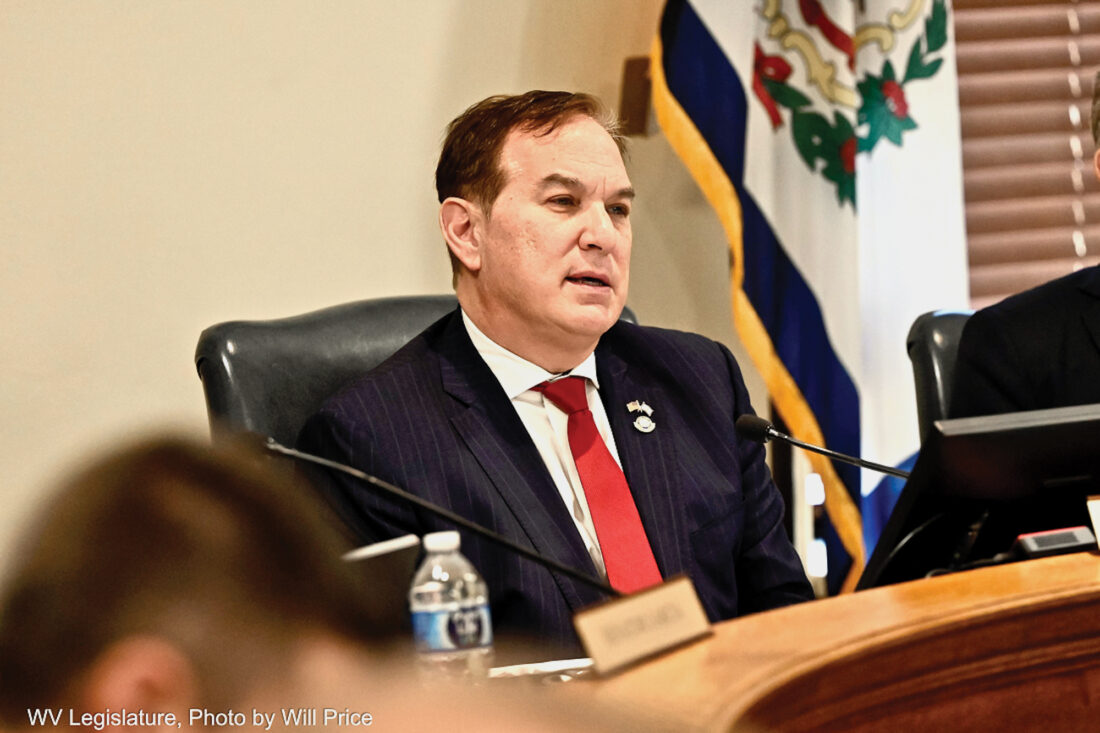Committee recommends bills for new death penalty

Photo Courtesy/WV Legislative Photography State Senate Judiciary Committee Chairman Mike Stuart brought back his bill to impose a death penalty on anyone convicted of murdering a law enforcement officer or first responder.
CHARLESTON — Members of the state Senate Judiciary Committee signed off on a bill to bring back the death penalty for anyone convicted of murdering a law enforcement officer or first responder.
The Senate Judiciary Committee recommended an amended committee substitute for Senate Bill 264, allowing the death penalty for intentionally killing law enforcement officers or first responders in line of duty, for passage. The bill’s next stop is the Senate Finance Committee.
SB 264 aims to reinstate the death penalty in West Virginia, but with a very specific scope: the intentional killing of a law enforcement officer or first responder while they are performing their official duties, and the defendant is aware of this fact.
The death penalty would only apply to first-degree murder where the victim was a law enforcement officer, or first responder killed intentionally while performing their duties. The legal process would involve two phases: one to determine guilt, and a separate sentencing phase.
A death sentence requires a unanimous jury decision and is subject to automatic review by the West Virginia Supreme Court. Expedited consideration by the State Supreme Court is required. The bill allows the state Division of Corrections and Rehabilitation to determine the method of execution through rulemaking, including emergency rules. However, lethal injection and firing squad are specifically mentioned.
West Virginia’s death penalty was eliminated in 1965. While there have been bills offered nearly every year to bring it back, those bills have been unsuccessful. Senate Judiciary Committee Chairman Mike Stuart, R-Kanawha, first offered a similar bill to SB 264 last year.
“Our law enforcement officers, our first responders face extreme challenges in the field today,” Stuart said. “They need to know…that these public servants who serve the public so selflessly on our behalf, that we hold them in such regard; that those folks who knowingly and intentionally place them at death and remove them from their families and their communities and their public service, that is the most heinous of crimes.”
According to a review of data by the counsel for the Senate Judiciary Committee, 21 law enforcement officers have been murdered in the line of duty in West Virginia over a 45-year period.
According to the Death Penalty Information Center, 27 states have the death penalty, with West Virginia being one of the 23 states without a death penalty. The governors of four states with the death penalty, including neighboring Ohio and Pennsylvania, have put a hold on executions. The federal government also has the death penalty for several crimes.
State Sen. Joey Garcia, D-Marion, opposed the bill, raising concerns about the morality of putting people to death, and the chance of putting people wrongly convicted to death.
“I’ve always thought we don’t have the death penalty because I think our morals and our values have aligned that it’s not the right thing to do for the state to put somebody to death,” Garcia said. “I believe that this bill, however narrowly it may be crafted, is morally repugnant in that regard and does not align with the values of the State of West Virginia and its people.”
Senate Majority Whip Jay Taylor, R-Taylor, said he has personal struggles with the bill, but said he would support it.
“I’ve always struggled with the death penalty, and I consider myself very, very extremely pro-life,” Taylor said. “I knew this was coming up and I reached out to my pastor. I was like, hey, what’s the correct thing to do here? And he came back and…one of the things he said was, Biblically, it is a life for a life. And then the last quote he sent me that really nailed it for me: literally, if it wasn’t for the sentence of death, the thief on the cross would have never been saved.”
A fiscal note from the Division of Corrections and Rehabilitation suggested a cost of between $24 million to $25 million, related to a proposed 75-person facility for death row inmates. However, language related to a new building was removed from the committee substitute.



